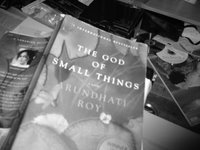Wednesday, July 19, 2006
And how, and how much
 NOBODY'S TALKING ABOUT GILAD SHALIT anymore. I think it's clear by now that the escalating violence in Israel, Gaza, and Lebanon has to with a lot more than kidnapped soldiers. I am certain I was not alone in my shock at Hamas' election within the Palestinian authority earlier this year; my only impression of them had been as a militant group, not as a political force. Perhaps I should not have been so surprised, since Hezbollah itself made a similar move in Lebanon not so long ago.
NOBODY'S TALKING ABOUT GILAD SHALIT anymore. I think it's clear by now that the escalating violence in Israel, Gaza, and Lebanon has to with a lot more than kidnapped soldiers. I am certain I was not alone in my shock at Hamas' election within the Palestinian authority earlier this year; my only impression of them had been as a militant group, not as a political force. Perhaps I should not have been so surprised, since Hezbollah itself made a similar move in Lebanon not so long ago.Stephen Harper's comments about Israel's response to the kidnappings, first of soldier Gilad Shalit in the Gaza strip and then of two soldiers into southern Lebanon a week ago, are, I think, rather insensitive. What man in his right mind could tell the families of the hundreds of Lebanese civilians killed in the last week that Israel's response to the crisis has been 'measured'? What about the millions in Lebanon and Gaza beng left with rapidly diminishing supplies of food and water, shelled-out roads and homes, no electricity, and no route by land, air, or sea, to reach safety? Would they agree with such a characterisation? Hezbollah's missiles are reaching further south into Israel than ever before, and dozens of Israelis have been killed or wounded in what the Israeli governement has already called a war. Don't they too have a vested interest in resolving the conflict peacefully, especially with speculation of the violence widening to neighbouring Syria? Or are other interests, such as destabilising Hezbollah and Hamas, worth the quickly rising cost of human life?
In her 1997 novel The God of Small Things, Arundhati Roy writes about history's hands, the hold they have on us. The book, set mainly in Kerala, India, tells the story of two twins, Estha and Rahel, caught between these fingers, about lives shaped by loss, and about the walls we construct between each other to draw a line and say, Here, this is where the extent of my love ends. It is with this in mind that I'd like to talk about another violence going on in Israel and the Occupied Palestinian Territories, one with perhaps even deeper dimensions than the airstrikes and shelling being hurled across borders in the region now. For some barriers are more devastating, more damaging, than even bullets can be.
It is probably impossible to divorce Arundhati Roy's work and life from her writing. Although The God of Small Things was extremely well-received upon publication, she has not written another novel since; instead, she has focussed on a number of non-fiction books relating to a number of political issues in India that she has been involved in, including the Narmada dam project and India's nuclear policies. Her writing has been compared to Salman Rushdie's in a number of respects--indeed, there are a good deal of similarities in their use of language and casual explanation/exploration of seemingly tragic events. The 'Midnight's Grandchild' epithet that has sometimes been attached to her is probably too narrow to describe Roy's elegant manipulation of voices and quiet sense of a moment's beauty and tragedy. The best parallel to draw between the authors is their passionate use of story-telling to uncover what's invisible, to refuse to allow ideas to go unspoken, to 'name the unnameable, to point at frauds, to take sides, start arguments, shape the world and stop it from going to sleep,' as it were.
 The book is told from the perspective of Estha and Rahel, children on the brink of becoming themselves, mostly as the story of a series of events and arrivals in 1969. Occasionally, we are brought back closer to the present, meeting the twins at an older age, and see them in a family torn apart like crumbling driftwood and framed in loss by something that happened that summer. Roy has a talent for giving the impression, throughout the novel, that the ending is contained in the beginning, that you already know how it will end; this does not diminish, however, her sharp tendency to elicit anguish in the midst of otherwise simple, dewdrop moments. There is an unspoken sense of a violence and intolerance lingering under some parts of the book that is most obvious when no one will acknowledge it. This is most clearly evident in the twins' fascinated horror at the brutal beating of a character who would otherwise be, at best, completely unremarkable to most of the Touchables in the town:
The book is told from the perspective of Estha and Rahel, children on the brink of becoming themselves, mostly as the story of a series of events and arrivals in 1969. Occasionally, we are brought back closer to the present, meeting the twins at an older age, and see them in a family torn apart like crumbling driftwood and framed in loss by something that happened that summer. Roy has a talent for giving the impression, throughout the novel, that the ending is contained in the beginning, that you already know how it will end; this does not diminish, however, her sharp tendency to elicit anguish in the midst of otherwise simple, dewdrop moments. There is an unspoken sense of a violence and intolerance lingering under some parts of the book that is most obvious when no one will acknowledge it. This is most clearly evident in the twins' fascinated horror at the brutal beating of a character who would otherwise be, at best, completely unremarkable to most of the Touchables in the town:'Blue-lipped and dinner-plate-eyed, they watched, mesmerized by something that they sensed but didn't understand: the absence of caprice in what the [attackers] did. The abyss where anger should have been. The sober, steady brutality, the economy of it all.'In the book Against the Wall, a collection of essays about the separation barrier by writers from Israel, Palestine, and around the world, Ariella Azoulay and Adi Ophir argue that the strategy being pursued by Israel with regards to the Palestinians is one of continuously exercising violence in the hopes of supressing it; not unrelated to the the attitude that, as Haifa University professor Steven Plaut wrote, 'no terrorist has ever murdered anyone else after being executed.' The belief in what Azoulay and Ophir call 'Violence that prevents violence' assumes that peace is impossible, a continuous renewal of a never-diminishing source of violence is inevitable, and it must be suppressed on a never-ending basis by whatever means possible.
The separation barrier itself, then, is seen as the most effective means of protecting Israeli citizens from attacks by Palestinian militants; it is disruptive, penetrable only on Israel's terms, and an extremely efficient method of communicating a very definitive message. It is a continuous disruption, a barrier being built with no intention of ever being dismantled, as a means of innoculating one population from physical violence by the other. And because it is being built on the terms of what Israel sees as its own security needs, its construction is backed by the seizure of Palestinian farmland, villages, and fields that are deemed necessary to protect the Israeli settlements in the West Bank and the ordinary cities and towns on the other side of the UN-backed Green Line border set down in 1967. The material environment in the whole region is being reimagined, with a heavy cost, in the interests of collective safety, and redefining human relationships with an ever heavier toll.
What Estha and Rahel witness in the casual, internalised brutality of that beating is similar; both depend on the belief that mutual understanding and cooperation is impossible, and the animosity is so entrenched in the relationship that it almost goes unnoticed, unseen, noticeable only in its absence; this is simply the way things are, and the only way they can ever be.
Ah, I drift.
If you recall a picture I posted here a few weeks ago of a head with its hands clasped, titled 'The Laws,' I'd like to explain what was behind it. That week was the anniversary of the discovery of HIV/AIDS, and 25 years later, stigma is still extremely strong around those people living with HIV around the world. This is what Roy refers to in The God of Small Things as The Laws of who should be loved, and how, and how much. We draw barriers between each other out of fear, out of anger, out of a lack of understanding, mostly, without realising how very much in common we have. In the novel, these barriers are the background to a loss that hollows out the twins' lives, that of their Ammu, their uncle Chacko, their aunt Baby Kochamma, and all of those around them. Their lives are framed by this absense, this emptiness, and its root is a series of events the book seems to lead inexorably towards, because the characters draw lines between each other, or have them drawn by history, to define what kind of love is allowed between them, if any, and what must happen if those rules are broken.
This wall, that not only divides Israelis and Palestinians, but also Palestinian families and friends from each other in its many incursions behind the Green Line, says that our collective imaginations have been exhausted, that there are no options beyond total separation, at any cost. Estha and Rahel have their futures redrawn for them in dark smudges of grief because the rules of love, its barriers, are broken. I know it sounds vague, but trust me, when you open this book you will be saturated by the ripples of this simple tragedy emanating through their lives. It's been called an apatheid wall, and in a sense, that's exactly what it is: the construction of a division between one group and the Other, which in turn fuels the conflict between them and exacerbates feelings of irreconcilable differences and mutual identification as Others.
My friends, there must be other options. I really believe there must be a way out of this lack of imagination. Perhaps, perhaps rockets will continue to be fired as long as grievances remain. I admit, there is so much that I don't understand about the conflicts in the Middle East. History tells so many of our stories for us before we've even arrived at them.
I'd like to share just one more moment from The God of Small Things; in this chapter, Rahel, a woman now, has sleeplessly wandered to a nearby temple in the night to witness Kathakali dancers buying back their dignity, as it were, by dancing for the gods at night after selling a cheap version of the divinity of their dances to languid tourists by day. Arundhati Roy has such a way of drawing you into her moments, about who we are. I hope the storytellers in Israel and Lebanon and Gaza find a peaceful way to resolve this conflict, to tell this story.
Anyway.
Rahel sat down cross-legged, resting her back against the roundness of a white pillar. A tall cannister of coconut oil gleamed in the flickering light of the brass lamp. The oil replenished the light. The light lit the tin.How does this story end?
It didn't matter that the story had begun, because Kathakali discovered long ago that the secret of the Great Stories is that they have no secrets. The Great Stories are the ones you have heard and want to hear again.The ones you can enter anywhere and inhabit comfortably. They don't deceive you with thrills and trick endings. They don't surprise you with the unforseen. They are as familiar as the house you live in. Or the smell of your lover's skin. You know how they end, yet you listen as though you don't. In the way that although you know that one day you will die, you live as though you won't. In the Great Stories you know who lives, who dies, who finds love, who doesn't. And yet you want to know again. That is their mystery and their magic.
posted by Christopher at 12:43 p.m.
2 Comments:
it is a pleasure to read.
may we meet again one day.
may we meet again one day.
Hey Chris...I love that book. Love it.
I've also been paying attention to what's happening in the Middle East and it scares me that Harper can have such a stand when there are 50 000 Canadians living in Lebanon. But Harper scares me in a lot of other ways too. Like his creepy creepy eyes.
Cheers
I've also been paying attention to what's happening in the Middle East and it scares me that Harper can have such a stand when there are 50 000 Canadians living in Lebanon. But Harper scares me in a lot of other ways too. Like his creepy creepy eyes.
Cheers

This work is licensed under a Creative Commons Attribution-Noncommercial-Share Alike 3.0 Unported License.



